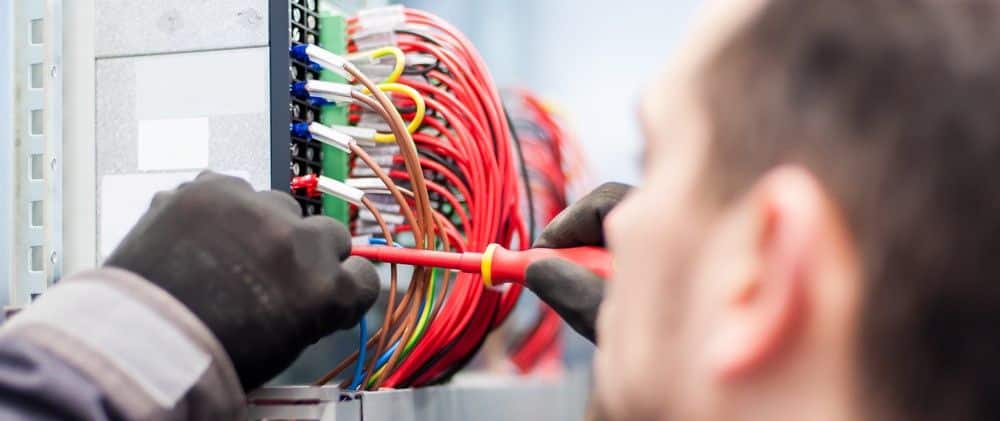House rewiring can be a highly disruptive process. The older your home and the more degraded the electrical wiring, the more complex the job may be. The work can be difficult to take on alone. In fact, it is extremely dangerous if you don’t have electrical experience.
Benefits of Rewiring Your House
A home rewiring project can give you peace of mind, but there are many benefits that impact function, affordability, and safety. These include:
- Elimination of faulty wiring that can cause a fire or electrical shock.
- Increased electrical capacity, supporting modern appliances and gadgets.
- Lower insurance quotes as your home is considered a lesser risk.
- Ability to add or move sockets and switches.
- An updated electrical system can increase property value.
Signs It’s Time for a Rewire
A range of electrical issues can require professional home repair services. The advice of a trained electrician will indicate whether a simple repair or house rewiring is needed if you have:
- Flickering Lights: A flickering light isn’t only tough on the eyes. It may be a sign of old or faulty wiring. A delay in response when you flip the switch is also a symptom.
- Outlet Problems: Electrical sparks, shocks, or loose outlets require urgent attention. If it’s difficult to insert a plug, it can cause an electrical arc or power surge.
- Circuit Breaker Tripping: Frequent tripping can indicate damaged wires are causing dangerous power surges in your home; the best option may be to replace them all.
- Evidence of Burning: When there are scorch marks on outlets and switches, burning smells, or sizzling sounds, the issue may extend to any electrical component behind your walls.
- Worn Out Wiring: If you see frayed wiring, its insulating material has worn to the point that the metal conducting wire is exposed and connections may become loose.
Inspect your wiring if your home was built more than 40 years ago and hasn’t had new wiring installed. Also, schedule a professional inspection if you’re using extension cords to get more power, have added new appliances, your home has old aluminum wiring (instead of copper), and your outlets are two-prong ungrounded types.
What to Consider If You Want to Rewire Your House
Rewiring your home involves many steps and an investment in time and finances. You, therefore, want the process to go as smoothly as possible. Reduce the stress and improve the odds of success with these key considerations:
- Hire a Registered Installer: A qualified electrician is trained, licensed, and equipped to take on this complicated, dangerous job. They have successfully completed numerous rewiring jobs like this and can install new electrical panels, circuits for high-power devices, and updates to existing circuits. The type of electrician you hire depends on the scale and complexity of the project.
- Plan Ahead Before You Move In: There’s a two-stage process that can make rewiring go smoother. Step one is to install the wiring that is absolutely necessary. This “first fix” includes back boxes for sockets and switches and cables run under floors and walls. The “second fix” involves installing sockets, light fittings, switch plates, and appliances such as electric fans, cookers, immersion heaters, etc.
If you’re rewiring a property you just purchased, coordinate the project with your move-in date. The job should start at least a couple of weeks prior. For a property you live in but are not otherwise remodeling extensively, obtain the same type of paint or wallpaper ahead of time so your home can be fully restored.
- Make a List of What Needs to Be Done: Are you doing a full or partial rewiring? Does the job involve just replacing worn-out wiring or will you need an electrical panel upgrade as well? By knowing what needs to be done, you can provide an electrician with more information. Inform them whether you plan to have a central AC on a separate line or need a dedicated circuit to power, for example, a cooker or hot tub.
- If the Home is Old, Consider a Rewire: Wires in old homes are often not up to code and can’t handle the loads required to run today’s consumer appliances. They can also be highly unsafe. Black and red wires are “hot wires”. Modern standards require brown for live wires, blue for neutral wires, and green/yellow as Earth colors. These have come far since wiring installations of the 1960s when sockets were mounted on skirting boards and cabling was made of rubber or fabric.
- Think About the Cost: You might spend thousands of dollars for a home rewiring. The cost includes materials and labor but is also impacted by the size of your house and where it is located. The larger the home, the more expensive rewiring it will be. Electricians often charge by the hour or day, rather than set prices for specific types of work. When you receive a quote, it should itemize all the costs of the project, so you know exactly what to expect.
Contact Black Hills Inc. Home Services Inc
Black Hills electric service technicians can assist with any type of house rewiring project. Our customers depend on us for quality service and parts, while our electrical professionals get the work done right the first time. A 100% Satisfaction Guarantee applies to every project. We are also a trusted Olympia HVAC company, but in addition to AC and furnace repair in Olympia, we provide plumbing, air quality, and other home repair services. Call us at 888-295-1201 or request service online to learn more.

